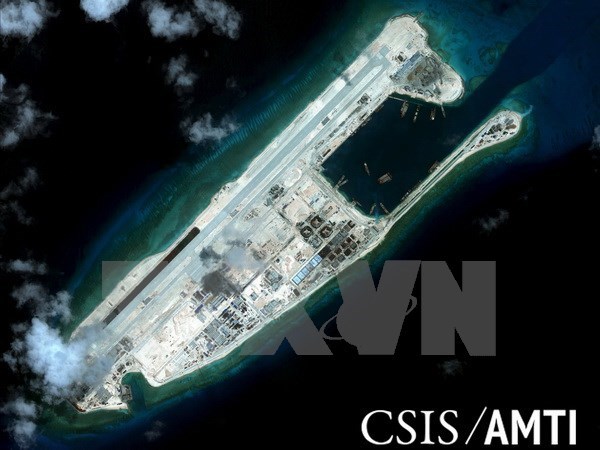Japan, Australia, India share strong concerns over East Sea tensions
Japan, Australia and India on February 26th agreed on the importance of maintaining the rule of law in the East Sea and shared “strong concerns” over tensions in the region amid China’s rising assertive move in the sea.
“We shared strong concerns about moves to unilaterally change the status quo that would lead to destablisation in the region”, Japan’s Vice Foreign Minister Akitaka Saiki told reporters after talks with secretary of Australia's Department of Foreign Affairs and Trade Peter Varghese and Indian Foreign Secretary Subrahmanyam Jaishankar in Tokyo.
“We also share the need to establish new rules in the region to secure the rule of law and the freedom of navigation”, Saiki added, referring to the ongoing discussions between China and ASEAN to conclude the Code of Conduct (COC) in the East Sea.
 |
Fiery Cross reef, located in Vietnam's Spratly Islands in the East Sea, is shown in a satellite image taken September 3rd, 2015. (Photo: Reuters/VNA)
Vietnamese Foreign Ministry’s spokesperson Le Hai Binh told reporters on February 25th that China’s acts, regardless of objections and concerns raised by Vietnam and the international community, not only seriously violate Vietnam’s sovereignty and accelerate militarisation in the East Sea, but also threaten peace and stability in the region as well as maritime and aviation security, safety and freedom in the Sea.
“Vietnam is strongly opposed to the actions that seriously infringe its sovereignty and demands China be responsible and constructive in words and deeds in maintaining peace and stability in the region and the world, and with respect for international law,” the spokesman stressed while again reiterating Vietnam’s indisputable sovereignty over Hoang Sa and Truong Sa archipelagoes./.
VNF/VNA
Recommended
 World
World
Thailand Positions Itself As a Global Wellness Destination
 World
World
Indonesia Accelerates Procedures to Join OECD
 World
World
South Korea elects Lee Jae-myung president
 World
World
22nd Shangri-La Dialogue: Japan, Philippines boost defence cooperation
 World
World
Pakistan NCRC report explores emerging child rights issues
 World
World
"India has right to defend herself against terror," says German Foreign Minister, endorses Op Sindoor
 World
World
‘We stand with India’: Japan, UAE back New Delhi over its global outreach against terror
 World
World
